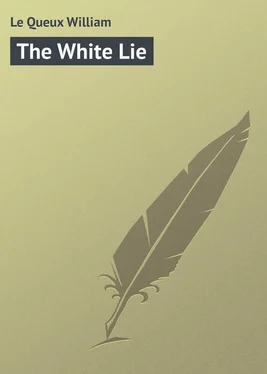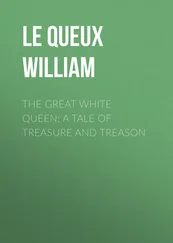William Le Queux - The White Lie
Здесь есть возможность читать онлайн «William Le Queux - The White Lie» — ознакомительный отрывок электронной книги совершенно бесплатно, а после прочтения отрывка купить полную версию. В некоторых случаях можно слушать аудио, скачать через торрент в формате fb2 и присутствует краткое содержание. Жанр: Классический детектив, foreign_detective, foreign_prose, на английском языке. Описание произведения, (предисловие) а так же отзывы посетителей доступны на портале библиотеки ЛибКат.
- Название:The White Lie
- Автор:
- Жанр:
- Год:неизвестен
- ISBN:нет данных
- Рейтинг книги:5 / 5. Голосов: 1
-
Избранное:Добавить в избранное
- Отзывы:
-
Ваша оценка:
- 100
- 1
- 2
- 3
- 4
- 5
The White Lie: краткое содержание, описание и аннотация
Предлагаем к чтению аннотацию, описание, краткое содержание или предисловие (зависит от того, что написал сам автор книги «The White Lie»). Если вы не нашли необходимую информацию о книге — напишите в комментариях, мы постараемся отыскать её.
The White Lie — читать онлайн ознакомительный отрывок
Ниже представлен текст книги, разбитый по страницам. Система сохранения места последней прочитанной страницы, позволяет с удобством читать онлайн бесплатно книгу «The White Lie», без необходимости каждый раз заново искать на чём Вы остановились. Поставьте закладку, и сможете в любой момент перейти на страницу, на которой закончили чтение.
Интервал:
Закладка:
“He seems to have signed his name across the front of it, too, before it was torn,” he added.
“The piece of card was carefully preserved in the inside pocket of his wallet,” the inspector said. “On the back, sir, you will see it is numbered ‘213 G.’”
The coroner turned it over and saw on the back the number and letter as the police-officer had stated.
“There are three others, almost exactly similar,” the inspector went on, producing them carefully from an envelope. “They are numbered ‘103 F,’ ‘91 I,’ and ‘321 G.’”
“Curious,” remarked the coroner, taking them. “Very curious indeed. They are all signed across, yet only half the card is preserved. They have some secret significance without a doubt.”
He glanced across at the stranger, but the face of the latter betrayed no sign of further interest. Indeed, just at that moment, when the whole court was on the tenterhooks of curiosity he looked as though bored by the entire procedure.
“The deceased carried a Smith-Wesson hammerless revolver fully loaded,” the officer added; “but he was so suddenly attacked, it seems, that he had no time to draw it.”
The detectives from Norwich who had the case in hand were not called to give evidence, for obvious reasons, but Dr. Dennan, of North Walsham, whom the police called, a short, white-haired, business-like little man, stepped forward, was sworn, and deposed that when he saw the body at Gordon’s Farm, deceased had been dead nearly two hours.
“He was struck in the throat by some thin, sharp instrument – a deep wound. The artery was severed, and death must have occurred within a few minutes,” he said. “Probably deceased could not speak. He certainly could not have uttered a cry. The blade of the instrument was, I should judge, only about half an inch wide, extremely keen, and tapered to a fine point. Whoever struck the blow was, I am inclined to think, possessed of some surgical knowledge. With Doctor Taylor, I made a post-mortem yesterday and found everything normal. There were some scratches and abrasions on the hands and face, but those were no doubt due to the deceased having been flung into the brambles.”
Again the grey-faced stranger craned his thin neck, listening to every word as it fell from the doctor’s lips.
And again the coroner noticed him – and wondered.
CHAPTER IV.
DESCRIBES A TORN CARD
“The Norfolk Mystery,” as it was termed by the sensational journalists and Press-photographers, was but a nine days’ wonder, as, indeed, is every modern murder mystery.
It provided material for the sensational section of the Press for a full week; a hundred theories were advanced, and the police started out upon a dozen or more false scents, but all to no purpose. Therefore the public curiosity quickly died down, and within ten days or so the affair was forgotten amid the hundred and one other “sensations” of crime and politics, of war rumours, and financial booms, which hourly follow upon each other’s heels and which combine to make up the strenuous unrest of our daily life.
And so was the fatal accident to the naval aviator quickly forgotten by the public.
Many readers of these present lines no doubt saw reports of both affairs in the papers, but few, I expect, will recollect the actual facts, or if they do, they little dream of the remarkable romance of life of which those two unexplained tragedies formed the prologue.
On the night when the coroner’s jury returned in the case of Richard Harborne a verdict of “Wilful murder by some person unknown,” a girl sat in her small, plainly-furnished bedroom on the top floor of a house in New Oxford Street, in London, holding the evening paper in her thin, nerveless fingers.
It was Jean Libert.
She had been reading an account of the evidence given at the inquest, devouring it eagerly, with pale face and bated breath. And as she read her chest rose and fell quickly, her dark eyes were filled with horror, and her lips were ashen grey. The light had faded from her pretty face, her cheeks were sunken, her face haggard and drawn, and about her mouth were hard lines, an expression of bitter grief, remorse, despair.
A quarter of an hour ago, while in the small, cheap French restaurant below, kept by her father – a long, narrow place with red-plush seats along the white walls and small tables set before them – an urchin had passed, selling the “extra special.” On the contents bill he carried in front of him were the words, in bold type: “Norfolk Mystery – Verdict.”
She had rushed out into the street, bought a paper, and hastily concealing it, had ascended to her room, and there locked herself in.
Then she sank upon her bed and read it. Three times had she carefully read every word, for the report was a rather full one. Afterwards she sat, the paper still in her white hand, staring straight at the old mahogany chest of drawers before her.
“Poor Dick!” she murmured. “Ah! Heaven! Who could have done it? Why – why was he killed on that evening? If he had not gone to Mundesley to meet me he would not have lost his life. And yet – ”
She paused, startled at the sound of her own voice, so nervous had she now become.
She glanced at the mirror, and started at sight of her own white, drawn countenance.
She placed both hands upon her eyes, as though striving to recall something, and in that position she remained, bent and pensive, for some moments.
Her lips moved at last.
“I wonder,” she exclaimed, very faintly, speaking to herself, “I wonder whether Ralph will ever know that I met Dick? Ah! yes,” she sighed; “I was foolish – mad – to dare to go to Mundesley that afternoon. If only I could have foreseen the consequence of our secret meeting – ah! if only I had known what I know now!”
Again she was silent, her face pale, with a fixed, intense look, when at last she rose, unlocked one of the small top drawers of the chest, and, taking the drawer entirely out, extracted something that had been concealed beneath it.
She held it in her hand. There were two halves of one of Dick Harborne’s visiting-cards – signed and torn across in a similar manner to those pieces which had been handed for the coroner’s inspection. Each half bore a number on its back, while on the front, as she placed them together, was Harborne’s name, both printed and written.
For a long time she had her eyes fixed upon it. Her brows narrowed, and in her eyes showed a distinct expression of terror.
“Yes,” she whispered; “I was a fool – a great fool to have dared so much – to have listened, and to have consented to go across to Bremen. But no one knows, except Dick – and he, alas! – he’s dead! Therefore who can possibly know? – no one.”
She held the halves of the torn card between her fingers for some moments, looking at them. Then, sighing deeply, she rose with sudden impulse and, crossing the room, took up a box of matches. Striking one, she applied it to the corners of the half cards and held the latter until the blue flame crept upwards and consumed them.
Then she cast them from her into the grate.
It was the end of her romance with that man who had been struck that cowardly blow in secret – Richard Harborne.
She stood gazing upon the tiny piece of tinder in the fender, immovable as a statue. Her dark brows slowly narrowed, her white, even teeth were set, her small hands clenched, as, beneath her breath, she uttered a fierce vow – a hard, bitter vow of vengeance.
Before her arose the vision of her good-looking lover, the man with the dark, intense eyes – Ralph Ansell. And then the memory of the dead Dick Harborne instantly faded from her mind.
Her romance with Dick had been but a passing fancy. She had never really loved him. Indeed, he had never spoken to her of love. Yet he had fascinated her, and in his presence she had found herself impelled by his charm and his easy-going cosmopolitanism, so that she had listened to him and obeyed, even against her own will.
Читать дальшеИнтервал:
Закладка:
Похожие книги на «The White Lie»
Представляем Вашему вниманию похожие книги на «The White Lie» списком для выбора. Мы отобрали схожую по названию и смыслу литературу в надежде предоставить читателям больше вариантов отыскать новые, интересные, ещё непрочитанные произведения.
Обсуждение, отзывы о книге «The White Lie» и просто собственные мнения читателей. Оставьте ваши комментарии, напишите, что Вы думаете о произведении, его смысле или главных героях. Укажите что конкретно понравилось, а что нет, и почему Вы так считаете.












